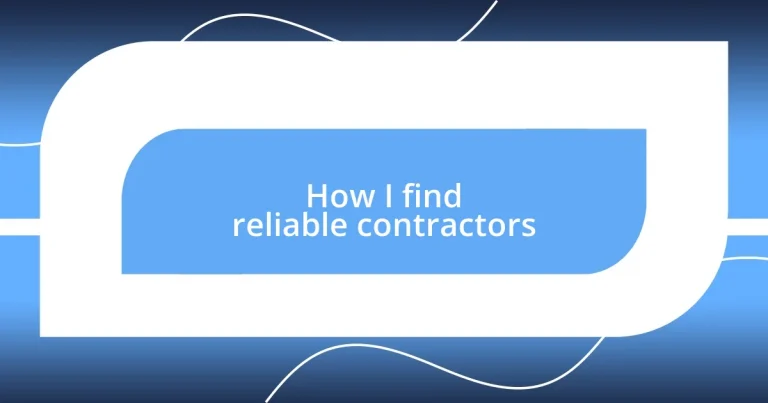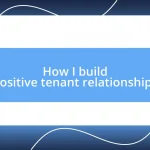Key takeaways:
- Reliable contractors communicate effectively, provide timely updates, and respect clients’ time, which builds trust and commitment to the project.
- Thoroughly researching potential contractors through online reviews, networking, and site visits reveals valuable insights about their reliability and workmanship.
- Evaluate contractors’ credentials, ask for detailed estimates, and trust your instincts when making the final selection to ensure a successful partnership.
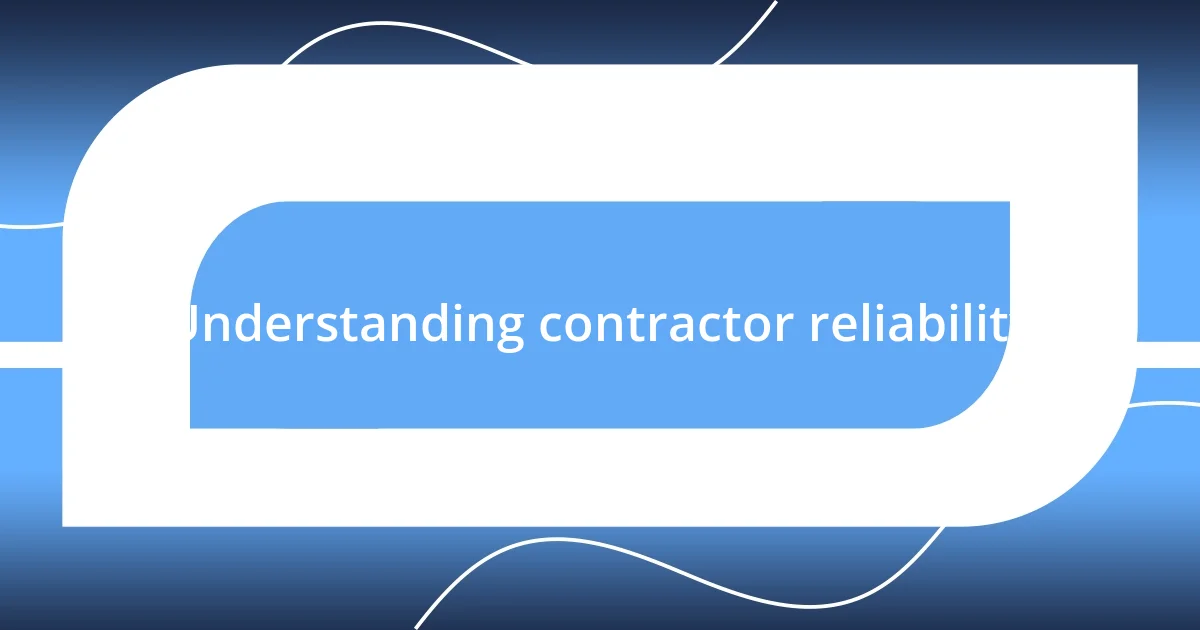
Understanding contractor reliability
Understanding contractor reliability is crucial to ensuring a successful project. From my experience, a reliable contractor is not just a skilled worker but someone who communicates openly and follows through on their commitments. Have you ever had a contractor go radio silent? It’s frustrating and can lead to project delays, making communication a key indicator of reliability.
One time, I hired a contractor who promised updates at specific milestones. Each time he delivered on those promises, my trust in him grew. It was reassuring to know that I was kept in the loop, which is essential in building a reliable working relationship. I found that when a contractor respects your time and keeps you informed, it’s a good sign that they value your project and are committed to its success.
Now, consider the importance of references and reviews. I once made the mistake of skipping this step and paid the price when the contractor turned out to be unreliable. Listening to past clients and understanding their experiences can save you not just money but a lot of stress. It prompts the question: Why would anyone skip this critical step?
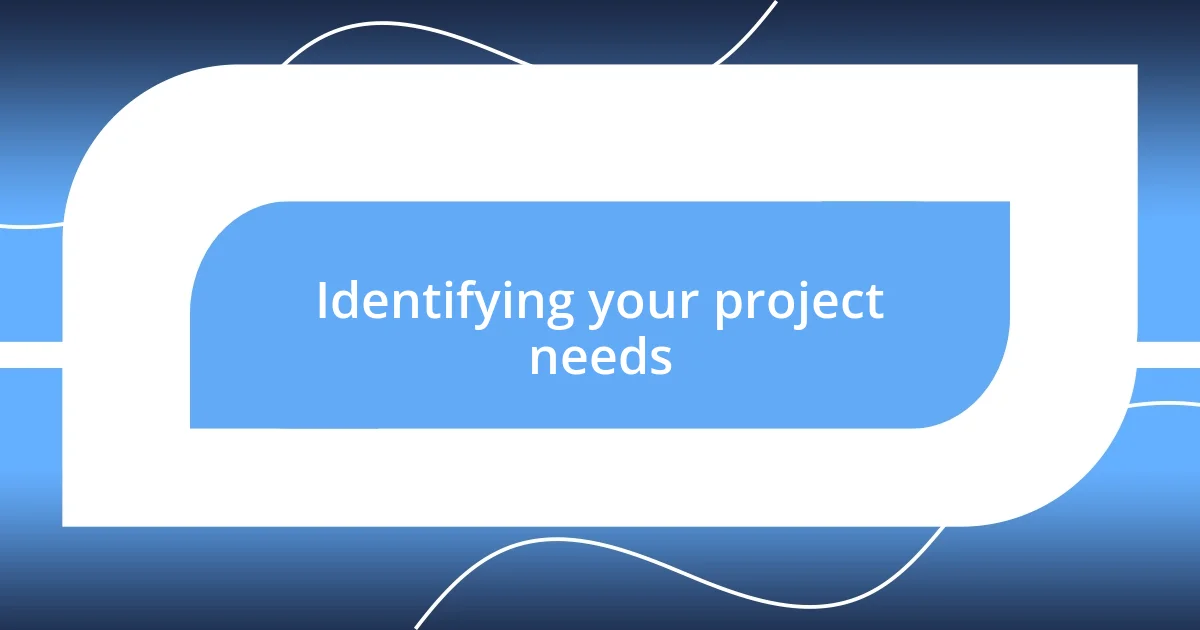
Identifying your project needs
When identifying your project needs, it’s essential to start with a clear vision of what you want to accomplish. I’ve often found that breaking down my goals into smaller, actionable tasks can illuminate the true requirements of the project. It’s like pulling back the layers of an onion; sometimes, you don’t realize how complicated it can be until you really dig in.
Here’s a quick checklist to help you assess your needs:
- Define the project scope: What exactly do you want to achieve?
- Determine your budget: How much are you willing to invest?
- Set a timeline: When do you need the project completed?
- Identify specific skills required: What expertise is essential for your project?
- Establish design preferences: What style or finish do you envision?
Recognizing these needs helps eliminate miscommunication down the line. There have been times when I thought I was clear, only to discover that my contractor had a different understanding. The frustration in those moments is palpable. By being precise about what I need upfront, I not only save myself headaches later but also attract contractors who are better suited for my vision.
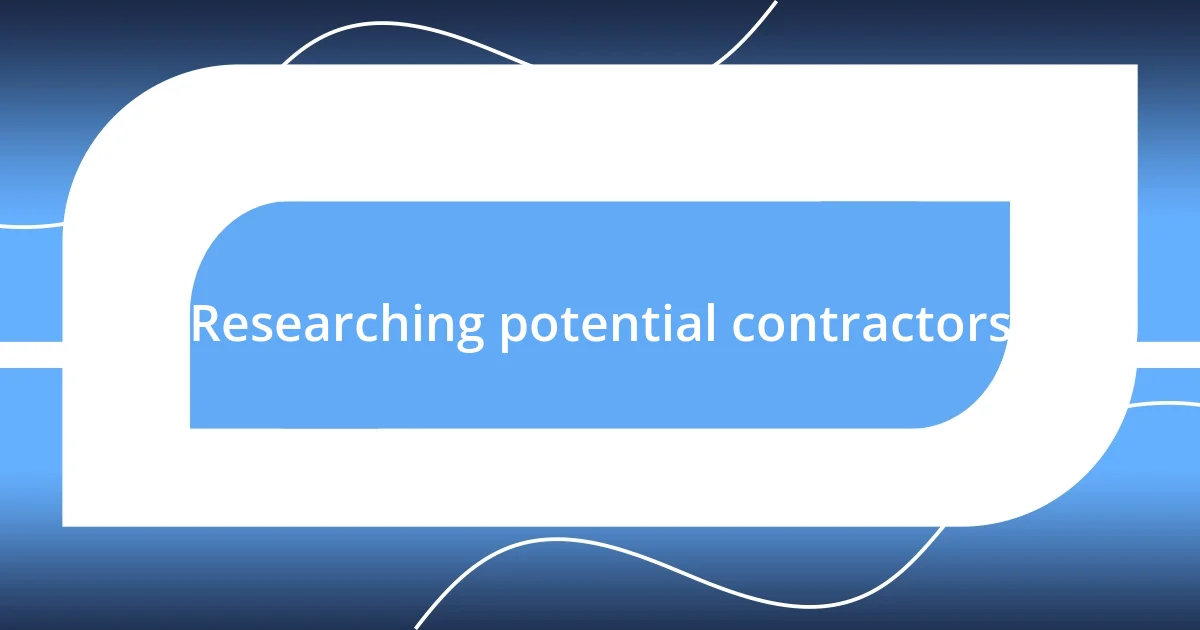
Researching potential contractors
When it comes to researching potential contractors, I find that a structured approach can make all the difference. I start by scouring online platforms for local contractors and checking for reviews. It’s fascinating how a few ratings and comments can reveal a lot about someone’s work ethic and reliability. The last time I did this, I stumbled upon a contractor whose portfolio showcased stunning work, but a few negative reviews flagged recurring issues, like missed deadlines. This drew me in, as it highlighted the importance of digging deeper.
Networking is another invaluable tool in this process. I often reach out to friends or family who’ve completed similar projects. Their firsthand experiences can shed light on contractors I might not have considered. One of my closest friends once recommended a contractor who had vastly exceeded his expectations. Hearing her enthusiasm about the project gave me confidence that I was on the right path.
Lastly, visiting a contractor’s previous job sites can provide insights that online reviews simply can’t match. I did this once, and I was surprised by how much I learned by observing the quality of work in person and chatting with the homeowner about their experience. It offered a way to gauge not only the finished product but the contractor’s demeanor and commitment to their craft.
| Research Method | Pros |
|---|---|
| Online Reviews | Accessible insights, broad range of feedback |
| Networking | Personal experiences, trusted recommendations |
| Site Visits | Direct assessment of quality, real-time interactions |
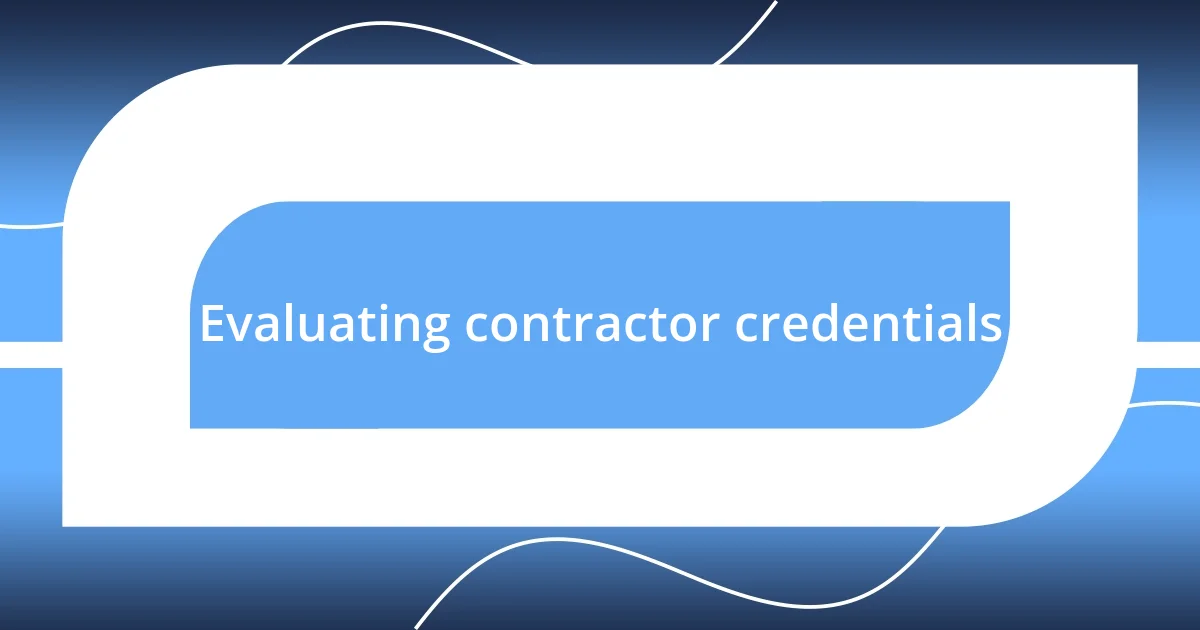
Evaluating contractor credentials
When it comes to evaluating contractor credentials, I believe that verifying licenses and insurance is non-negotiable. The last thing you want is to be left in a lurch when something goes wrong during a project. I once had a contractor skip out halfway due to a lack of proper insurance, which left me with a costly mess to sort out. So, always ask for proof of these credentials upfront to safeguard your investment.
Additionally, checking for relevant certifications can provide an extra layer of assurance. For example, if you’re working on a specialized project like a kitchen renovation, I’ve found it beneficial to seek out contractors who have certifications in that specific area. This specialization often means they have the right training and knowledge to handle the unique challenges that may arise. Think about it: would you trust a general practitioner to perform heart surgery? Similarly, specialized skills in contracting can make a world of difference.
Finally, don’t overlook the value of professional affiliations. I’ve learned that contractors who belong to organizations like the National Association of Home Builders often adhere to higher ethical standards and stay updated on industry best practices. Connecting with someone who values their reputation enough to engage in these professional communities gives me peace of mind. Their commitment reflects a dedication to excellence you might not find elsewhere.
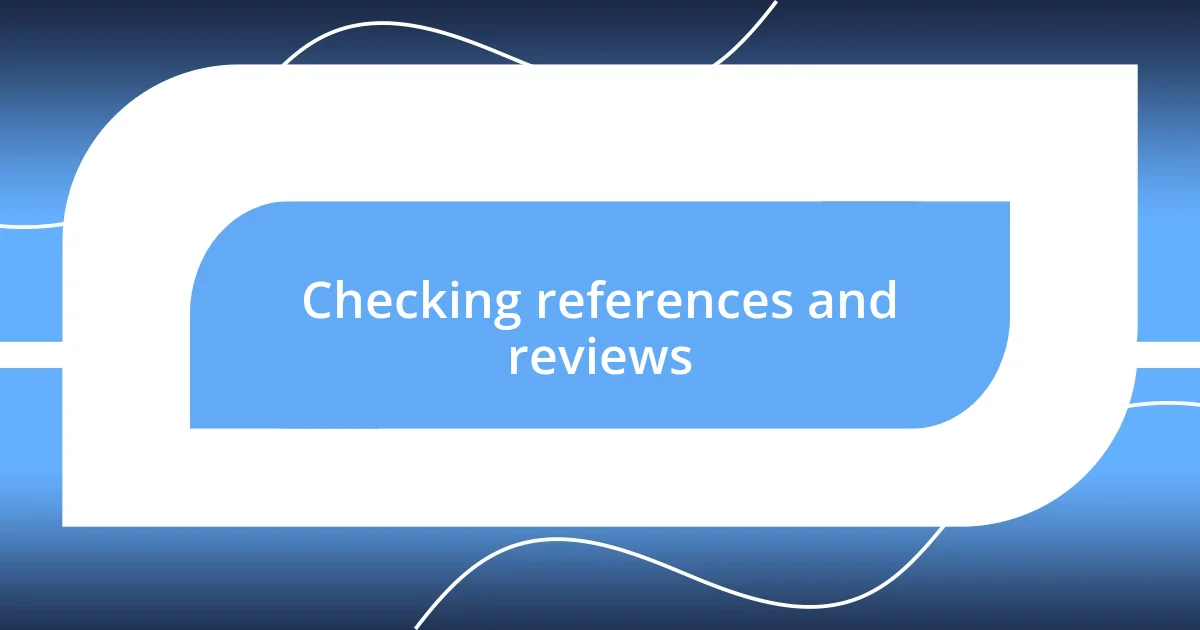
Checking references and reviews
When checking references and reviews, I always focus on the details that go beyond just star ratings. A memorable experience for me was when I found a contractor praised for their craftsmanship but criticized for communication. That warning sign made me rethink my options; after all, a beautifully finished project is only valuable if it’s delivered on time and with good communication. Isn’t it comforting to know what you might encounter before diving in?
As I reach out to previous clients, I tend to ask specific questions that probe deeper. For instance, I once inquired about how responsive a contractor was throughout a project. One homeowner shared that their contractor was great at first, but communication dwindled as the project progressed. Hearing this firsthand not only helped me adjust my expectations but also reinforced the importance of staying in touch. Have you ever felt left in the dark during a project? It can be incredibly frustrating.
Sometimes, I also take a constructive approach by analyzing patterns in reviews. If multiple clients mention the same issue, I can’t ignore the warning signs. I once dismissed a contractor whose glowing reviews revealed a troubling trend regarding their cleanup habits—it seemed they often left jobs untidy. This made me realize that it’s not just about how skilled they are but also how they treat the spaces they work in. In my experience, these insights can save not just time but also potential headaches down the line.
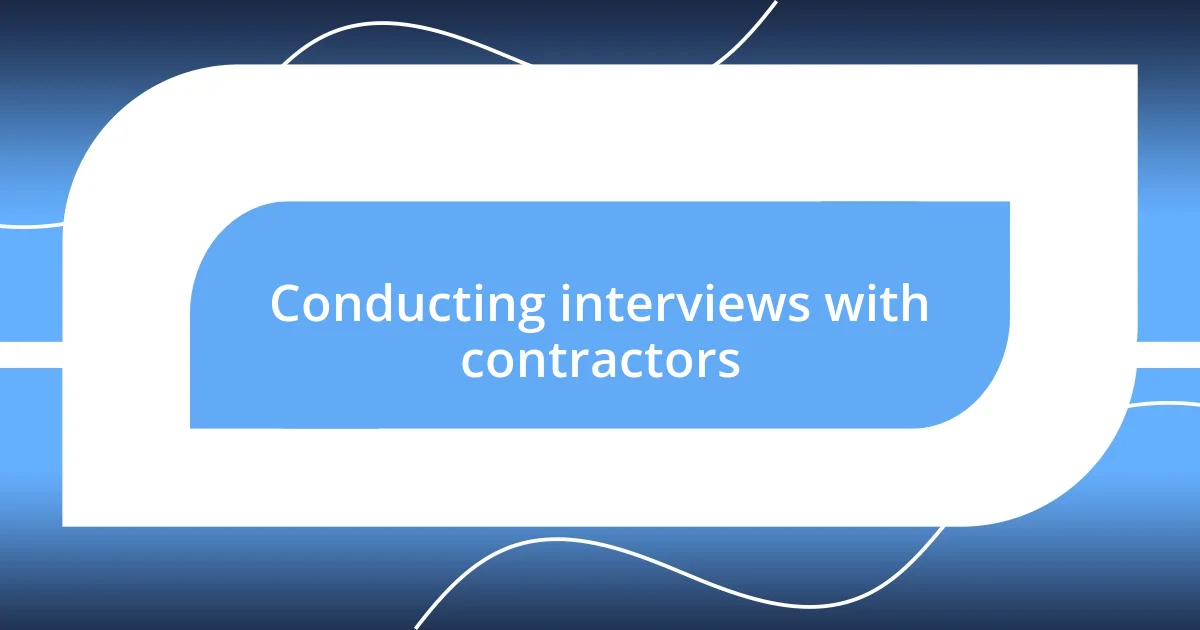
Conducting interviews with contractors
Conducting interviews with contractors is a critical step in my contractor-selection process. I’ve learned that the right questions can reveal a lot about a candidate’s expertise and work ethic. For instance, I always ask about their approach to handling unexpected challenges—believe me, those always pop up! When one contractor described how he dealt with a surprise plumbing issue on a past job, it reassured me that he could manage potential complications effectively.
I also pay attention to how contractors communicate during the interview. Their willingness to listen and engage speaks volumes. I recall one contractor who asked thoughtful questions about my project goals, which created an immediate rapport. Wasn’t that a refreshing change from others who seemed more concerned with promoting themselves? Engaging in a genuine dialogue helps me gauge if this person would be responsive and collaborative throughout the project.
Lastly, I like to establish a personal connection. I once met a contractor who shared a brief story about a challenging project he completed. The passion and enthusiasm in his voice were palpable, making it clear he genuinely cared about his work. This personal touch reinforces my belief that a contractor’s attitude can make or break the overall experience. After all, isn’t it better to work with someone who approaches projects with heart and dedication?
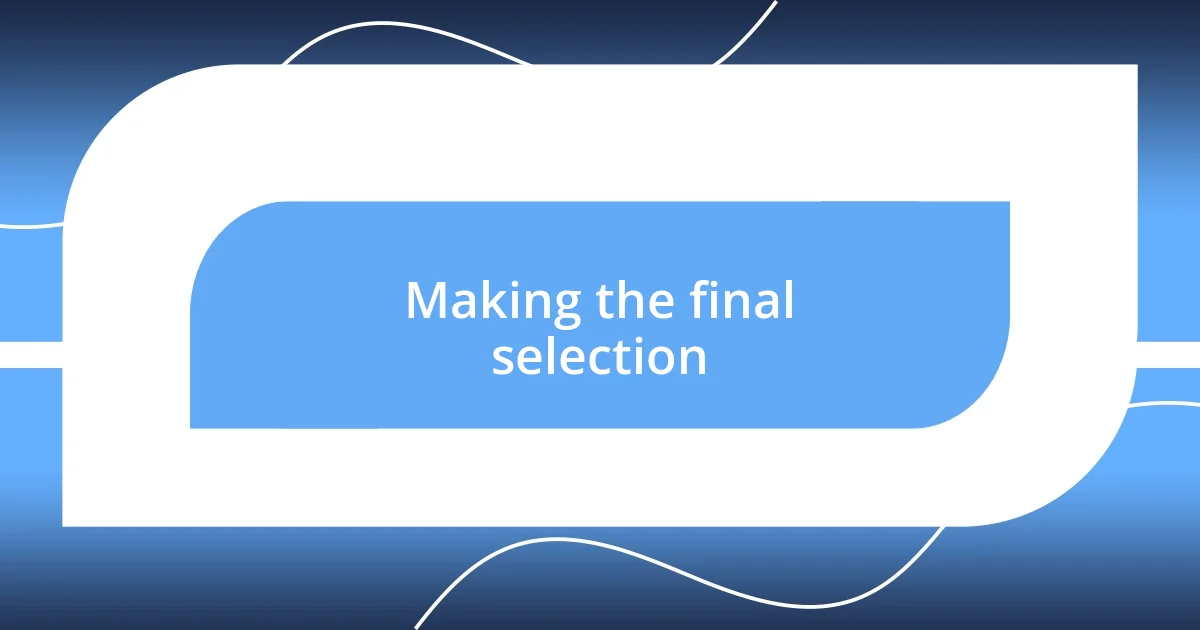
Making the final selection
When it comes to making the final selection, I often find my instincts play a significant role. For example, there was a time when I had narrowed my choices down to two contractors. One was highly skilled but felt somewhat robotic in our interactions, while the other exuded warmth and enthusiasm. In the end, I chose the latter, trusting that a strong personal connection would facilitate better communication throughout the project. Have you ever sensed that gut feeling nudging you in a particular direction?
I also consider the detailed estimates each contractor provides. It’s not just about the numbers for me; it’s about the clarity and breakdown of the costs. I recall receiving an estimate that seemed competitive until I noticed several vague line items. This lack of transparency raised red flags and prompted me to ask for clarification—a decision that ultimately saved me from unexpected expenses. I always ask myself, can I trust someone who isn’t forthcoming about costs?
Finally, I prioritize timelines. I once faced a tough choice between a contractor who could start immediately and another with a wait time that extended several weeks. Despite my eagerness to dive into the project, I chose the more reliable contractor who had a stacked schedule because their portfolio and reviews spoke volumes. You know how critical timing can be, right? Sometimes, it’s worth the wait for the right person.












